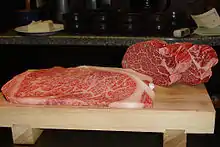wagyu
English

A filet of wagyu beef
Etymology
From Japanese 和牛 (wagyū), from Middle Chinese 和 (MC hwa, “a gloss for 倭 (MC 'wa, “Japan”)”) + 牛 (MC ngjuw, “cow”).
Pronunciation
- IPA(key): /ˈwæɡ.juː/, /ˈwɑːɡ.juː/, (nonstandard) /ˈwæ.ɡuː/
Noun
wagyu (countable and uncountable, plural wagyus or wagyu)
- (countable) Any of several Japanese breeds of cattle genetically predisposed to intense marbling and to producing a high percentage of oleaginous unsaturated fat.
- Beef from such cattle.
Synonyms
Derived terms
Indonesian
Etymology
Borrowed from Japanese 和牛 (wagyū), from 和 (わ, wa, “Japan”) + 牛 (ぎゅう, gyū, “cow, bull, ox, cattle; beef”).
Pronunciation
- IPA(key): /wa.ɡʲu/
- Hyphenation: wa‧gyu
Noun
wagyu (first-person possessive wagyuku, second-person possessive wagyumu, third-person possessive wagyunya)
- (cooking) wagyu: any of several Japanese breeds of cattle genetically predisposed to intense marbling and to producing a high percentage of oleaginous unsaturated fat.
Further reading
- “wagyu” in Kamus Besar Bahasa Indonesia, Jakarta: Agency for Language Development and Cultivation – Ministry of Education, Culture, Research, and Technology of the Republic of Indonesia, 2016.
This article is issued from Wiktionary. The text is licensed under Creative Commons - Attribution - Sharealike. Additional terms may apply for the media files.